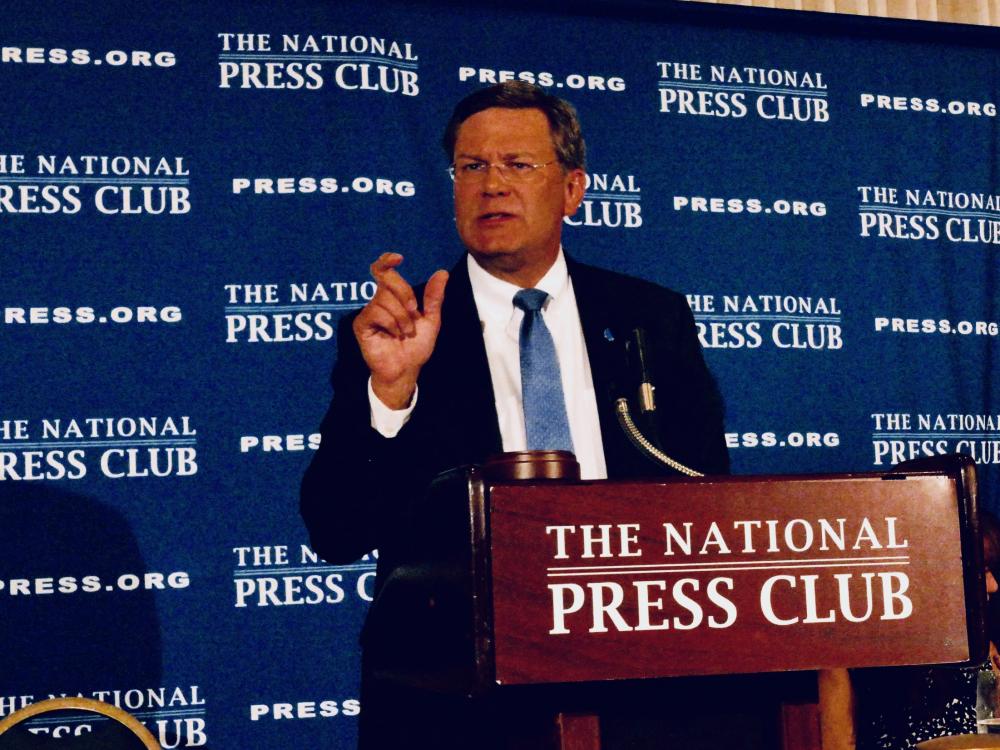Corteva AgriSciences chief highlights climate in luncheon talk
 Corteva CEO Jim Collins. Photo: Marshall Cohen
Corteva CEO Jim Collins. Photo: Marshall Cohen
A difficult planting season due to extreme weather this year is an early sign that U.S. farmers and agribusinesses will have to adjust to changing climate patterns, Jim Collins, chief executive officer of Corteva AgriSciences, said Wednesday at a National Press Club Headliners luncheon.
Collins, who leads one of the nation's biggest agribusinesses, said U.S. farmers still don't know whether they can recover from the worst planting seasons on record. The coming harvest season will tell how big a dent last spring’s flooding rains put in the nation’s supply of corn, soybeans and other Farm Belt staples, he said.
The extreme weather hit Corteva’s bottom line as farmers suddenly adjusted their planting plans and bypassed some seeds that would normally be treated with the company’s pesticides ahead of planting, Collins said. Corteva is a top seller of seeds and farm chemicals, including pesticides and seed treatments to fight bugs and diseases.
“2019 was the absolute worst start" in 150 years of record-keeping, Collins said. “It was the latest, wettest, coldest start to a year.”
The result, he said, was a “tremendous shift” in the company’s seed distribution as conditions altered where and when farmers could plant their crops. Within three weeks, he said, farmers planted around 90 million acres of corn and 80 million acres of soybeans.
“When that season shifted like that, we were moving products all around the country to satisfy that,” Collins said. “That crop is in the ground and it’s developing, and we’ll still see how that turns out.”
This year's extreme weather illustrates the challenge for Corteva and other agribusinesses as they try to anticipate and prepare for the impacts of climate change. That’s a top goal for Corteva, Collin said, as the company invests more than $1 billion a year in research and development. Corteva is the seed and farm chemical spinoff of DowDuPont. It became an independent, publicly traded company in June.
Collins said he believes agriculture can be a major player in reducing the effects of climate change while maintaining profitability for farmers, but he sidestepped a question about reducing meat consumption, a regular target of climate policy activists. Instead, he said, officials should focus on outcomes, such as reducing greenhouse gas emissions, rather than telling people what to eat or not eat.
Producing more food efficiently and in a climate-conscious manner is critical, he said. A growing world population requires food production to increase by 70% over the next 30 years, he noted.
Collins said he’s aware that much of the public says it doesn’t trust big agricultural companies, but does trust farmers. And while pesticides can be a controversial topic, raising regulatory issues and questions about impact to pollinators and other difficulties, they’re critical tools for farmers, he said. Corteva constantly looks for new crop treatments that can safely fight bugs and weeds, he said.
Climate change is one of a few agriculture issues that should concern the public, Collins said, including fair agricultural trade, acceptance of technological innovations in agriculture such as gene editing and farmer and consumer attitudes about food production.
“Ag is at an incredible juncture,” Collins said. “It may be the most challenging of times for us, but I believe with that comes opportunity, a chance to do some things differently.”
